|
|
|
Sort Order |
|
|
|
Items / Page
|
|
|
|
|
|
|
| Srl | Item |
| 1 |
ID:
050965
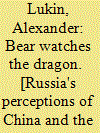

|
|
|
|
|
| Publication |
Armonk, M. E. Sharpe, 2003.
|
| Description |
xxiv, 415p.
|
| Standard Number |
0765610256
|
|
|
|
|
|
|
|
|
|
|
|
Copies: C:1/I:0,R:0,Q:0
Circulation
| Accession# | Call# | Current Location | Status | Policy | Location |
| 047917 | 327.4705109/LUK 047917 | Main | On Shelf | General | |
|
|
|
|
| 2 |
ID:
132706
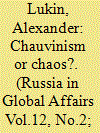

|
|
|
|
|
| Publication |
2014.
|
| Summary/Abstract |
Instead of chauvinism and chaos Russia needs a third alternative. And that is a combination of moderate patriotism and moderate liberalism manifesting itself in the commitment to freer life by law, without corruption, but with mature self-government.
|
|
|
|
|
|
|
|
|
|
|
|
|
|
|
|
| 3 |
ID:
159172
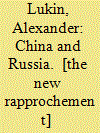

|
|
|
|
|
| Publication |
Cambridge, Polity Press, 2018.
|
| Description |
xvii, 220p.pbk
|
| Standard Number |
9781509521715
|
|
|
|
|
|
|
|
|
|
|
|
Copies: C:1/I:0,R:0,Q:0
Circulation
| Accession# | Call# | Current Location | Status | Policy | Location |
| 059396 | 327.47086051/LUK 059396 | Main | On Shelf | General | |
|
|
|
|
| 4 |
ID:
098019
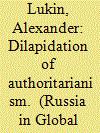

|
|
|
| 5 |
ID:
145812
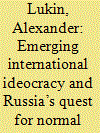

|
|
|
|
|
| Summary/Abstract |
This article analyses modern Western society from the standpoint of the concept of ‘ideocracy’. The author suggests that the development of mass societies and mass ideologies—noted by a number of theorists and philosophers since the end of the 19th century—led to a qualitatively new level of social development in the second half of the 20th century. The globalisation of the economy and mass communications has led to the globalisation of the masses, beyond the confines of national borders. That, in turn, has served as the basis for the appearance of a new social structure: the international ideocracy. This article describes the primary features of that structure, the path of its likely development and its interaction with the non-ideological world—as defined by the notion of ‘normalcy’. It also examines Russia’s possible path of development as a state that finds itself on the borders of ideological societies.
|
|
|
|
|
|
|
|
|
|
|
|
|
|
|
|
| 6 |
ID:
130859
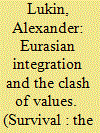

|
|
|
|
|
| Publication |
2014.
|
| Summary/Abstract |
Putin has now established an independent power centre in Eurasia. Although economic considerations are important, they are also secondary to a set of values differing from those preached by the West.
Since the Enlightenment, the driving concepts of Western civilisation have been the belief in its own superiority and the theory of linear progress in human society. According to this understanding, the West (firstly Europe, and later the United States) reached the highest and most advanced level of development, with all other countries moving along the same continuum, although lagging behind and located at various stages of proximity to this ideal.
In fact, many civilisations have considered themselves superior to others. The Ancient Greeks, Romans, medieval Chinese and many others all believed that they had reached the pinnacle of social development. However, the last few centuries of industrial success and military power have reinforced the theory of the West's superiority, with the result that Western notions of progress have long captured the thinking of most of the world.
|
|
|
|
|
|
|
|
|
|
|
|
|
|
|
|
| 7 |
ID:
083916
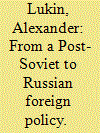

|
|
|
| 8 |
ID:
181347
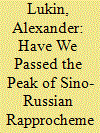

|
|
|
|
|
| Summary/Abstract |
Russian-Chinese rapprochement is one of the most important modern geopolitical shifts. Recently, it seems that those who argue that closer relations between Moscow and Beijing stem from their converging interests, values, and worldviews have won out over those who claimed theirs is essentially a marriage of convenience—a tactical arrangement for countering attacks by the United States and its allies. According to some forecasts, the mutual understanding between the two countries will deepen in the foreseeable future and they will form, if not a formal then at least a de facto, alliance. Events indicate that, in fact, Russia and China have strengthened their interaction.
|
|
|
|
|
|
|
|
|
|
|
|
|
|
|
|
| 9 |
ID:
149568
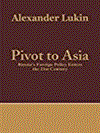

|
|
|
|
|
| Publication |
New Delhi, Vij Books India Pvt Ltd, 2017.
|
| Description |
viii, 430p.hbk
|
| Standard Number |
9789385563645
|
|
|
|
|
|
|
|
|
|
|
|
Copies: C:1/I:0,R:0,Q:0
Circulation
| Accession# | Call# | Current Location | Status | Policy | Location |
| 058920 | 327.47/LUK 058920 | Main | On Shelf | General | |
|
|
|
|
| 10 |
ID:
143026


|
|
|
|
|
| Summary/Abstract |
Near the turn of the twenty-first century, one of the two poles of the system that had prevailed since the end of the Second World War destroyed itself. The Soviet communist project had become uncompetitive, leading to its failure. Soviet ideology had cornered itself. Derived from the Western Enlightenment tradition, its ideas of technological progress and the satisfaction of people’s physical needs were not new. But Soviet ideology vowed that faster progress would be achieved not by enhancing self-rule and respect for individual rights and private property, but by concentrating resources in the hands of the state, nationalising property and ensuring its fair distribution. This project proved economically unviable. In addition, the Soviet Union set for itself the ideological goal of spreading its system to as many countries as possible and, eventually, to the whole world. This ambition wasted considerable resources and exacerbated economic problems.
|
|
|
|
|
|
|
|
|
|
|
|
|
|
|
|
| 11 |
ID:
185985
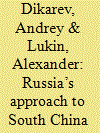

|
|
|
|
|
| Summary/Abstract |
The territorial dispute in the South China Sea (SCS) affecting China and several ASEAN countries has already resulted in drawn-out political tensions in the region. However, one aspect of the dispute is rarely discussed: its influence on Sino-Russian relations and its possible role as a case study in analysing the character of these relations. While Russia moves closer to China in the dispute it still refrains from support of its territorial claims and develops close relations with some of China’s regional opponents such as Vietnam and India. This article describes most recent Russian economic and political activity in the region involving these countries with the aim of clarifying whether the Russian approach to problems in the SCS can be understood as an attempt to balance, bandwagon or hedge against growing Chinese influence, or whether Moscow’s approach is guided by different considerations.
|
|
|
|
|
|
|
|
|
|
|
|
|
|
|
|
| 12 |
ID:
148723
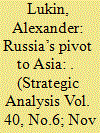

|
|
|
|
|
| Summary/Abstract |
The article discusses the changes in Russia’s policy towards Asia, arguing that Russia’s pivot to Asia is a reality, one that is motivated by both political and economic interests. And although that shift is not progressing as quickly as some might want and occasionally encounters difficulties, the process has definitely begun and is in all likelihood irreversible. Only a small, marginal segment of Russian society continues to dream of unity with Europe—which itself has entered a period of severe crisis. Most of the Russian elite as well as the majority of Russian citizens understand that nobody is waiting for them with open arms. Therefore, not wanting a confrontation and in an effort to maintain working relations, Russia—under any leader—is unlikely to seek a relationship based on a common outlook. That will move Russia ever closer to the non-Western world, primarily the Asian giants.
|
|
|
|
|
|
|
|
|
|
|
|
|
|
|
|
| 13 |
ID:
163770
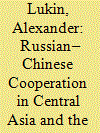

|
|
|
|
|
| Summary/Abstract |
The author argues that Russian–Chinese rapprochement is a fundamental feature of the current changing system of international relations. Apart from its own significance, it has become important because it stimulated and, in some cases, laid the foundation for many broader international processes: the creation of the multipolar world, the emergence of such international groups and organisations as BRICS and Shanghai Cooperation Organisation (SCO), the coordination between Eurasian Economic Union and the Chinese initiative of Silk Road Economic Belt and others. Recently, all these processes led to the idea of Greater Eurasia or Eurasian partnership.
|
|
|
|
|
|
|
|
|
|
|
|
|
|
|
|
| 14 |
ID:
189292
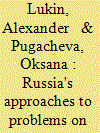

|
|
|
|
|
| Summary/Abstract |
This article comprehensively examines Russia's foreign policy with respect to the Korean Peninsula. This article is relevant because of the unsettled problems on the Korean Peninsula, including the nuclear problem, and the peninsula's geographical proximity to the Russian Far East, whose development is a priority task for Russia in the 21st century. Russia is interested in peace on the Korean Peninsula, its denuclearization, and the development of multilateral economic cooperation there. In principle, Russia would not object to the reunification of Korea, provided that the unification process takes place peacefully, in conditions of social stability,
|
|
|
|
|
|
|
|
|
|
|
|
|
|
|
|
| 15 |
ID:
078209
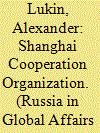

|
|
|
|
|
| Publication |
2007.
|
| Summary/Abstract |
The United States' political image in Central Asia, especially after the problems with Uzbekistan, has been considerably undermined. The majority of Central Asian countries understand that political orientation toward Washington may bring about many problems at home
|
|
|
|
|
|
|
|
|
|
|
|
|
|
|
|
| 16 |
ID:
106819
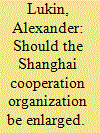

|
|
|
| 17 |
ID:
172483
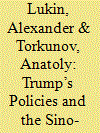

|
|
|
|
|
| Summary/Abstract |
The main geopolitical consequence of US policy is that it drives Moscow and Beijing closer together.
|
|
|
|
|
|
|
|
|
|
|
|
|
|
|
|
| 18 |
ID:
163591
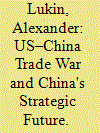

|
|
|
|
|
| Summary/Abstract |
The Trump administration’s confrontational approach has prompted a serious debate in China about the country’s economic and political course.
|
|
|
|
|
|
|
|
|
|
|
|
|
|
|
|
| 19 |
ID:
170688
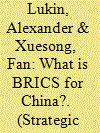

|
|
|
|
|
| Summary/Abstract |
This article studies China’s approach to BRICS. It argues that China sees BRICS as a major asset in its effort to become a major world power and to reform the international system so that it becomes fairer and better serve its interests. However, in China’s view, these interests coincide with the interests of other major non-Western states which also suffer from this sense of unfairness, therefore this position is not self-seeking. This is a major problem which should be overcome with the help of other developing countries. But to change the situation, not a revolution but a gradual evolution based on negotiations and persuasion, is needed. This position makes China not a revisionist but rather a conservative power, within the existing international system.
|
|
|
|
|
|
|
|
|
|
|
|
|
|
|
|
| 20 |
ID:
132134
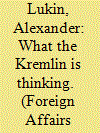

|
|
|
|
|
| Publication |
2014.
|
| Summary/Abstract |
Soon after the Soviet Union's collapse in 1991, Western leaders began to think of Russia as a partner. Although Washington and its friends in Europe never considered Moscow a true ally, they assumed that Russia shared their basic domestic and foreign policy goals and would gradually come to embrace Western-style democracy at home and liberal norms abroad. That road would be bumpy, of course. But Washington and Brussels attributed Moscow's distinctive politics to Russia's national peculiarities and lack of experience with democracy. And they blamed the disagreements that arose over the former Yugoslavia, Iraq, and Iran on the short time Russia had spent under Western influence. This line of reasoning characterized what could be termed the West's post-Soviet consensus view of Russia.
|
|
|
|
|
|
|
|
|
|
|
|
|
|
|
|
|
|
|
|
|